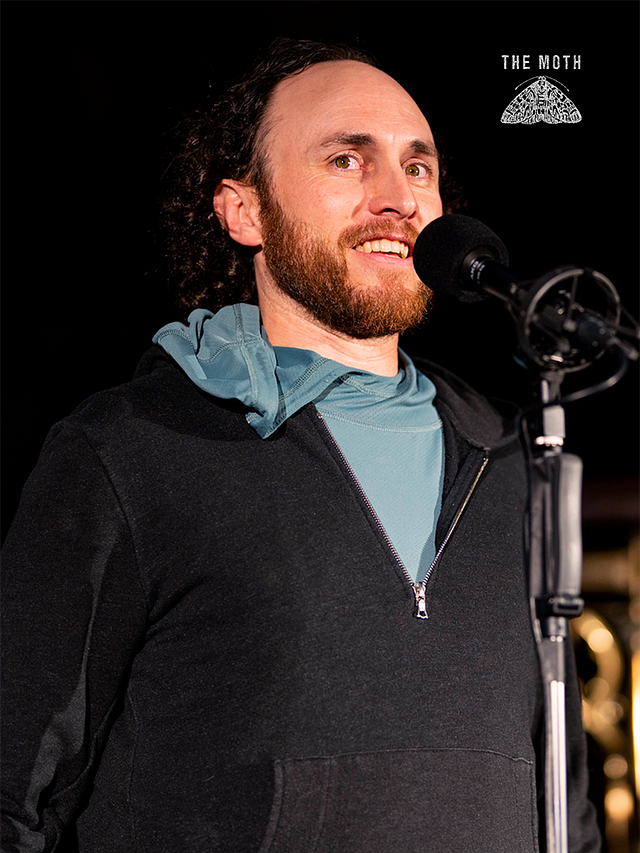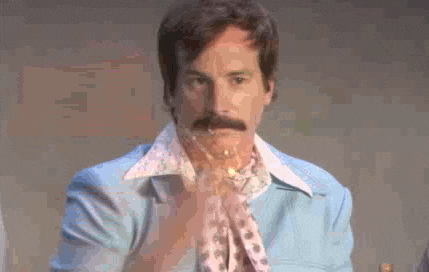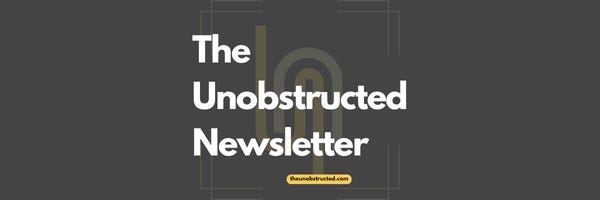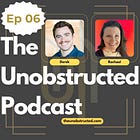Your Most Competitive Advantage Doesn’t Seem Competitive—To YOU
48. Don't dim your light, it's my newsletter birthday!
“But how do you find your competitive advantage?”
It was a good question.
Especially since I’d said:
Your most competitive advantage doesn’t seem competitive—to YOU.
I’d even said that not using your competitive advantage because it makes you different, is exactly why you should be using it.
hey. hi. hello.
Welcome back or welcome to Unobstructed. We did it—an entire lap around the sun!
This newsletter just tuned a whopping 12 months old.
It started with posting monthly, then biweekly, weekly, and now twice a week. And it turned into loving writing again. Oh, and finding my voice—literally, I launched a podcast.
In the last year, Unobstructed grew by 500%.
No hustle-culture or growth hacks. Just a whole lotta learning, doing, failing, and trying again.
I really love this shit.
And I’m so grateful you’re here for the party.
So, how do you find your competitive advantage?
I can only tell you what it’s looked like for me.
If it helps, great! If not, tell me to kick rocks.
The short answer?
I started asking what I could give instead of what I could get.
The longer answer?
After my traumatic brain injury, i needed to find a way to increase my income.
That’s why I desperately needed to wrap my head around the competitive advantage I knew existed. Surely, it’d been somewhere right under my nose…
Part of how I’d made my living before my TBI was as an outdoor guide, leading people through technical mountain terrain. I was good at identifying sticky situations and teaching people how to avoid them. But coaching people through solving them was where I really shined.
My particular brand of problem solving included a healthy dose of humor, calm, and patience. Still does, don’t you worry. Reflecting on my skills and what I could do with them helped uncover where to start searching for my competitive advantage.
It really wasn’t until after I got sober that things clicked for me, though.
I’d asked close friends what they’d liked about our friendship. What was it that I could do that they most appreciated? I’d asked my coworkers in tech, too. I’ve even asked ChatGPT to tell me “something you know about me that I don’t know about myself” and “something I think is obvious that others wouldn’t?”
But letting go of what others think of me was the tipping point.
I hadn’t realized how much I’d been limiting myself.
It was journaling that unlocked the intersection of what i liked to do and what others sought my help with. From there, I kept trying and failing my way through the options that showed up. That approach is still working, btw.
I like simplifying tech systems. People come to me for help untangling and understanding how things connect.
The kicker?
Plenty of people can do those things.
But only I can do them like me.
So, I stand by it: your most competitive advantage doesn’t seem competitive—to YOU.
Shine bright.
Dimming your light makes the world less bright for the rest of us, too.
The latest, from me.
Check out the latest episode of The Unobstructed Podcast.
You can also listen on Spotify, Apple Podcasts, and Amazon Music.
I publish twice weekly—one podcast & one email—alternating between essays and resource roundups like this one.
The latest, from my rotation.
watch.
I Slept At Citi Field In The Dead Of Winter with Timm Chiusano.
How To Record and Edit A Podcast For Beginners with Bridget O’Rourke.
Frequently Asked Questions on Writing Plot #4.5 with Brandon Sanderson.
listen.
Getting into good trouble with Chris Sacca and Tim Ferriss.
When your flaw becomes your competitive advantage with Hasan Minhaj and Simon Sinek.
The creative psychology behind Pixar’s Inside Out with Meg LeFauve and Michael Gervais.
read.
If you aren't screwing up, you're aiming too low by Michael Thompson.
You Will Never Get Promoted If You Keep Doing This by Kathy Wu Brady.
Waiting until you’re ready feels safe, but it’s failure in slow motion by Kat Nieh.
Spotlight.
One wrong step, and he was free-falling into a crevasse.
At 23, Monte Montepare was working as a glacier guide in Alaska.
Sometimes the people you underestimate the most are the ones you need when shit hits the fan. That’s what his journey’s about. When an expedition he was leading became life or death, he was—truly—shit out of luck.
But that’s not why I was completely engrossed in his Moth story.
It’s the way he openly talks about humility.
It’s profound, terrifying, and hilarious.
On this particular trip, he’d been leading a group of people who’d never set foot on ice before. They’d actually only bought their gear the day before. But that’s also why they’d hired a guide. Monte was they guy who knew what he was doing—the expert.
And then he wasn’t.
Nature doesn’t care how experienced you are. Neither does the world, for that matter. Let’s say you fell into a glacial crevasse while professionally guiding a group of people…what would you do?
If you, like me, have been gloriously humbled in excruciatingly visible circumstances, you’ll love this Moth story.
Listen to Monte Montepare’s Red Flags and Blue Ice [starting at 37:44]:
Watch Monte Montepare’s Red Flags and Blue Ice:

 Tiktok failed to load.
Tiktok failed to load.Enable 3rd party cookies or use another browser
Talk soon.
Thank for being here. Cheers to year 2!
See you next time.
onward.
-dmac
P.S. Building your own newsletter? Use this free checklist to try the 5 Ps framework.
Love the weekly newsletter? Go deeper with long-form articles from me that dig into simplifying work and making room for life, with a paid subscription to Unobstructed.








Congrats Derek! It's an awesome newsletter.
Happy Birthday Unobstructed!